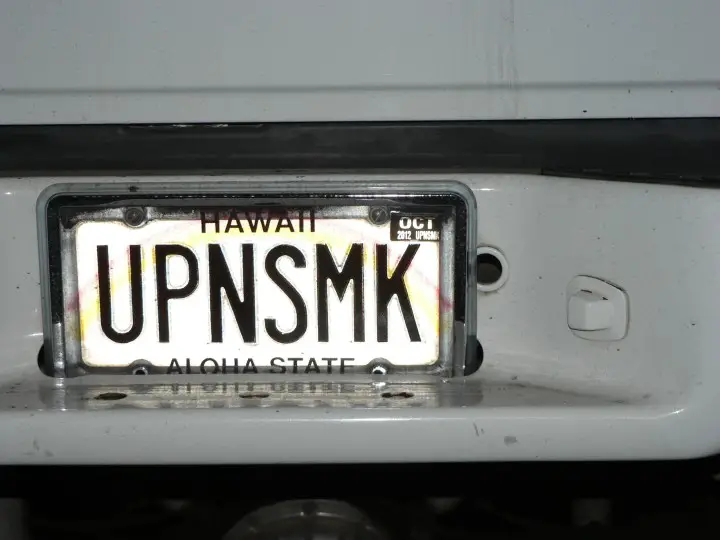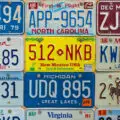Last Updated on May 1, 2023 by QCity Editorial Stuff
Whether you can use your old license plate on the new car depends on the specific laws and regulations in the state where you live. In most USA states you can use your old license plate on the new car if the old license plate is still valid and in good condition as well as the new vehicle is of the same type and class as the old one.
What Are The Requirements For Transferring License Plates To A New Car?

- The requirements for transferring license plates to a new car typically include the following:
- Both the old and new vehicles must be registered in the same name.
- The old license plates must be in good condition and not expired.
- The new vehicle must be of the same type as the old vehicle (e.g. passenger car, truck, motorcycle, etc.).
- The new vehicle must meet the state’s emissions and safety requirements.
- The owner must provide proof of insurance for the new vehicle.
Reasons for Wanting to Use an Old License Plate
There are several reasons why someone might want to use an old license plate on a new car. Here are a few possible reasons:
- Sentimental value: The old license plate may have sentimental value to the owner, perhaps because it belonged to a previous car that was special to them, or because it has a certain number or combination of letters that holds personal significance.
- Cost savings: Depending on the laws and regulations in your area, it may be less expensive to transfer an old license plate to a new car than to obtain a brand-new license plate. This can be especially true if the old license plate is still in good condition and does not need to be replaced.
- Convenience: Transferring an old license plate to a new car can be a convenient way to avoid the hassle of obtaining a new license plate and updating registration and insurance documents. It can also help to ensure that the new car is easily identifiable as belonging to the same owner as the previous car, which can be useful in situations such as parking permits or toll booths.
- Environmental concerns: Some people may choose to reuse an old license plate on a new car as a way of reducing waste and promoting sustainability. By reusing a license plate, they can help to reduce the amount of new materials that need to be produced and the amount of old materials that need to be discarded or recycled.
Rules and Regulations of Using Old License Plate On New Car
The rules and regulations for using an old license plate on a new car vary depending on the state or country where you live. Here are some general guidelines that may apply:
- Validity: The old license plate must be valid and not expired. If the plate has expired or has been invalidated, it cannot be used on a new car.
- Ownership: The old license plate must be registered to the same person who is registering the new car. If the old plate is registered to someone else, it cannot be transferred to the new car.
- Type of vehicle: The old license plate may only be used on a new car of the same type and class as the old car. For example, a license plate that was registered to a car cannot be transferred to a motorcycle.
- Condition: The old license plate must be in good condition and not damaged or defaced. If the plate is damaged, it may not be able to be transferred to the new car.
- Regulations: Check with your local Department of Motor Vehicles (DMV) or other relevant authority to find out the specific rules and regulations for transferring license plates in your area. Some states or countries may have additional requirements or restrictions that must be followed.
It’s important to follow the rules and regulations for using an old license plate on a new car to avoid any legal issues or fines. Make sure to check with the appropriate authority in your area to ensure that you are following the proper procedures.
Process of Transferring an Old License Plate to a New Car

The process of transferring an old license plate to a new car varies depending on the state or country where you live. Here are some general steps that may apply:
- Check eligibility: Verify that you are eligible to transfer the old license plate to the new car. Make sure that the plate is valid, registered with you, and can be used on the type of vehicle you are registering.
- Obtain necessary documents: Depending on your area, you may need to provide certain documents such as the old license plate, vehicle registration, proof of insurance, and identification. Check with your local DMV or relevant authority to find out what documents you need.
- Complete forms: Fill out any necessary forms or applications required for the transfer. These may include a license plate transfer application and/or registration renewal form.
- Pay any fees: There may be a fee for transferring the old license plate to the new car. Check with your local DMV or relevant authority to find out the amount and how to pay.
- Complete the transfer: Once all requirements have been met, submit the necessary documents and fees to the appropriate authority. They will then process the transfer and issue you a new registration for the new car with the old license plate number.
Risks of Using an Old License Plate on a New Car
There are some risks associated with using an old license plate on a new car. Here are a few potential risks:
- Legal issues: If you use an old license plate on a new car that is not eligible for transfer, or if you fail to follow the proper procedures for transferring the license plate, you could face legal issues such as fines or penalties.
- Identity theft: If your old license plate falls into the wrong hands, it could be used to steal your identity or commit other fraudulent activities. It’s important to safeguard your old license plate and report it immediately if it is lost or stolen.
- Insurance issues: Using an old license plate on a new car could potentially cause issues with your insurance coverage. If your insurance company is not aware of the change in vehicle or license plate, they may not cover any accidents or incidents that occur.
- Safety concerns: If the old license plate is damaged or in poor condition, it may not be as visible or readable as a new license plate. This could potentially cause safety issues if law enforcement or other drivers are unable to identify your vehicle properly.
FAQs
Can I transfer my old license plates to a new car in any state?
No, the requirements for transferring license plates vary by state.
Do I have to pay a fee to transfer my personalized license plates to my new car?
It depends on the state and the specific requirements for transferring personalized plates. In some states, there may be additional fees.
Can I use my old license plates on a leased car?
This may depend on the leasing company’s policies and the requirements in your state. It’s best to check with the leasing company and your local DMV to determine the rules for transferring plates to a leased vehicle.
Can I transfer my license plates from one vehicle to another within the same household?
This may be possible in some states, but the rules and requirements vary. Check with your local DMV to determine the rules for transferring plates between vehicles in the same household.
Conclusion
In conclusion, it is usually possible to transfer your old license plates to your new car, but the requirements and procedures for doing so vary by state. It’s important to check with your local DMV to make sure you follow the rules and regulations. By taking the time to properly transfer your plates, you can save money and keep the same personalized plates you may have grown attached to over the years.
References:
https://www.jdpower.com/cars/shopping-guides/how-do-you-transfer-plates-from-one-car-to-another
https://carfromjapan.com/article/industry-knowledge/can-i-use-my-old-license-plate-on-my-new-car/






